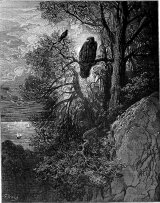The Eagle and the Magpie
"The Eagle and the Magpie" is a captivating folktale by Jean de La Fontaine, a renowned French fabulist. A story centred around the association of a noble eagle and a cunning magpie, it uses the relationship and interactions of these two vastly different characters to deliver profound morals and life lessons. A well-written, thought-provoking narrative, it very subtly reflects on human society and behaviours through the representation of these birds.
The Eagle, queen of the broad sky, Met, one day, in a field, the Pie-- In mind and language different, In plumage, and in every bent. Chance brought them into a by way: The Magpie was afraid to stay. The Eagle, having dined but lately, Assured her calmly and sedately. "Come, let's be social," said the Eagle, then; "And if the lord of gods and men Sometimes is weary of the king Who rules the universe, the thing Is clear, that ennui may e'en vex One who serves Jove. Amuse me!--come, And chatter as you do at home; It is not me you will perplex." The Pie began at once to gabble On this and that, on lords and rabble; Just like the man in Horace--just, Good, bad, indifferent, all on trust; Talking incessant, and still worse Than the poor fool in the famed verse. She offers, if it please his grace, To skip about, and watch each place He wishes. Jove knows that the Pie Was well constructed for a spy. The eagle answers, angrily, "Don't leave your home, my tattling friend. Adieu! I have no wish to send A gossip to corrupt my court, And spread each lying, false report: I hate a gossip." Quite content, Maggy cared little where she went. To dwell among the gods or kings Is not the pleasantest of things; That honour has its pangs also. Detractors, spies, and many a foe, Gracious and bland enough in face, But false in heart, infest each place, And make you odious. In courts wear Coats of two colours, or take care.
Translation
Translate and read this book in other languages:
Select another language:
- - Select -
- 简体中文 (Chinese - Simplified)
- 繁體中文 (Chinese - Traditional)
- Español (Spanish)
- Esperanto (Esperanto)
- 日本語 (Japanese)
- Português (Portuguese)
- Deutsch (German)
- العربية (Arabic)
- Français (French)
- Русский (Russian)
- ಕನ್ನಡ (Kannada)
- 한국어 (Korean)
- עברית (Hebrew)
- Gaeilge (Irish)
- Українська (Ukrainian)
- اردو (Urdu)
- Magyar (Hungarian)
- मानक हिन्दी (Hindi)
- Indonesia (Indonesian)
- Italiano (Italian)
- தமிழ் (Tamil)
- Türkçe (Turkish)
- తెలుగు (Telugu)
- ภาษาไทย (Thai)
- Tiếng Việt (Vietnamese)
- Čeština (Czech)
- Polski (Polish)
- Bahasa Indonesia (Indonesian)
- Românește (Romanian)
- Nederlands (Dutch)
- Ελληνικά (Greek)
- Latinum (Latin)
- Svenska (Swedish)
- Dansk (Danish)
- Suomi (Finnish)
- فارسی (Persian)
- ייִדיש (Yiddish)
- հայերեն (Armenian)
- Norsk (Norwegian)
- English (English)
Citation
Use the citation below to add this book to your bibliography:
Style:MLAChicagoAPA
"The Eagle and the Magpie Books." Literature.com. STANDS4 LLC, 2025. Web. 14 Jan. 2025. <https://www.literature.com/book/the_eagle_and_the_magpie_2682>.




Discuss this The Eagle and the Magpie book with the community:
Report Comment
We're doing our best to make sure our content is useful, accurate and safe.
If by any chance you spot an inappropriate comment while navigating through our website please use this form to let us know, and we'll take care of it shortly.
Attachment
You need to be logged in to favorite.
Log In